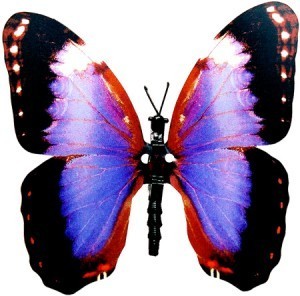Broken Heart – A Butterfly Died Today
 Sunday, January 22, 2012, a butterfly died today in Worchester, MA and Joe Pa died in State College, PA. Feeling very low, I decided to venture out alone, take in some football, and meet some new people. Chance was gracious in the form of a beautiful young woman, 25-year-old Suzelle. Securing a seat at the bar at Woody's in Bethlehem, PA, I complimented her New York Giant's "Tuck" jersey. She stated that her ex had given it to her. Instantaneously the look of heartbreak came over her face. Before I could demonstrate my newfound relation through empathy, a bartender interrupted us and thanked me for helping her last month with a love issue. As the bartender quoted a passage from her favorite new book The Artful Science of True Love, Suzelle's curiosity was piqued.
Sunday, January 22, 2012, a butterfly died today in Worchester, MA and Joe Pa died in State College, PA. Feeling very low, I decided to venture out alone, take in some football, and meet some new people. Chance was gracious in the form of a beautiful young woman, 25-year-old Suzelle. Securing a seat at the bar at Woody's in Bethlehem, PA, I complimented her New York Giant's "Tuck" jersey. She stated that her ex had given it to her. Instantaneously the look of heartbreak came over her face. Before I could demonstrate my newfound relation through empathy, a bartender interrupted us and thanked me for helping her last month with a love issue. As the bartender quoted a passage from her favorite new book The Artful Science of True Love, Suzelle's curiosity was piqued.
Apparently, her boyfriend of two years had broken off their relationship one week ago and she was hurting. Her lower lip quivered, eyes welled up, and in a quiet, shaky voice she stammered, "I really love him you know." While discussing the particulars through her pain and anguish, at one point she managed a half-hearted smile and bravely stated, "I guess it wasn't meant to be." I told her that sometimes the pain of loss could be eased through understanding the brain chemistry involved. She seemed unconvinced.
Neuroscience has made tremendous inroads to understanding the effects of some neurotransmitters (specialized brain hormones) on human mood and behavior. The brain chemicals that we know of typically associated with the fear of loss and separation anxiety include Epinephrine (Adrenaline), norepinephrine, and serotonin among others. In certain combination, these brain chemicals cause emotional pain. In a love loss there is the additional withdrawal from the neurotransmitters of love, Oxytocin, Vasopressin, and Dopamine that abruptly stop flowing when a love relationship ends. Good chemistry stops, bad chemistry starts, the perfect storm for heartache.
Recent discoveries in neuroscience can only uncover what is happening and that is only half the story. For the why we must look to evolutionary biology. Separation causes our instincts to kick in. The pain produced by the associated brain chemicals has evolved to force us to return to our mate. This is a special evolved response for pair-bonded species. It is an effective survival strategy response insuring reproduction.
Explaining the involuntary instinctual reaction to a love separation and the associated brain chemistry seemed to help Suzelle feel a little better. As for me, not so much.



